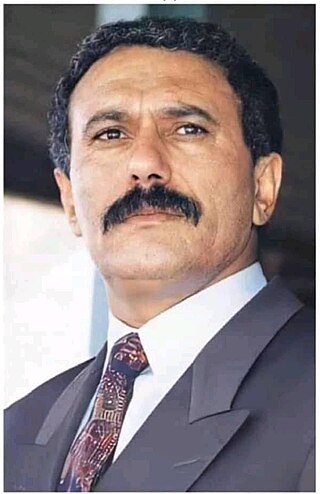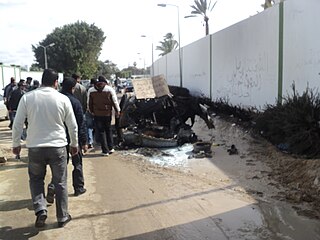
The Politics of Yemen are in an uncertain state due to the Houthi takeover in Yemen. An armed group known as the Houthis or Ansar Allah seized control of the Northern Yemeni government and announced it would dissolve parliament, as well as install a "presidential council", "transitional national council", and "supreme revolutionary council" to govern the country for an interim period. However, the deposed president, Abdrabbuh Mansur Hadi, has declared he is still in office and is working to establish a rival government in Aden.

Ali Abdullah Saleh Affash was a Yemeni military officer and politician who served as the first president of the Republic of Yemen from the Yemeni unification in 1990 until his resignation in 2012, following the Yemeni revolution. Previously, he had served as the fourth and last President of the Yemen Arab Republic, from July 1978 to 22 May 1990, after the assassination of President Ahmad al-Ghashmi. al-Ghashmi had earlier appointed Saleh as military governor in Taiz.

The Houthi insurgency, also known as the Houthi rebellion, the Sa'dah Wars, or the Sa'dah conflict, was a military rebellion pitting Zaidi Shia Houthis against the Yemeni military that began in Northern Yemen and has since escalated into a full-scale civil war. The conflict was sparked in 2004 by the government's attempt to arrest Hussein Badreddin al-Houthi, a Zaidi religious leader of the Houthis and a former parliamentarian on whose head the government had placed a $55,000 bounty.

The Yemeni revolution followed the initial stages of the Tunisian Revolution and occurred simultaneously with the 2011 Egyptian revolution and other Arab Spring protests in the Middle East and North Africa. In its early phase, protests in Yemen were initially against unemployment, economic conditions and corruption, as well as against the government's proposals to modify Yemen's constitution. The protesters' demands then escalated to calls for the resignation of Yemeni President Ali Abdullah Saleh. Mass defections from the military, as well as from Saleh's government, effectively rendered much of the country outside of the government's control, and protesters vowed to defy its authority.

Tawakkol Abdel-Salam Khalid Karman is a Yemeni journalist, politician, and human rights activist. She co-founded and leads 'Women Journalists Without Chains', a group established in 2005 to advocate for press freedom and human rights. She became the international public face of the 2011 Yemeni uprising that was part of the Arab Spring movement. She was often referred as the 'Iron Woman' and the 'Mother of the Revolution" in Yemen. She is a co-recipient of the 2011 Nobel Peace Prize for "non-violent struggle for the safety of women and for women's rights to full participation in peace-building work". She became the first Yemeni, the first Arab woman, and the second Muslim woman to win a Nobel Prize.

United Nations Security Council Resolution 1970 was a measure adopted unanimously by the UN Security Council on 26 February 2011. It condemned the use of lethal force by the government of Muammar Gaddafi against protesters participating in the Libyan Civil War, and imposed a series of international sanctions in response.

The Cabinet of Yemen refers to the governing body of the internationally recognized government of the Republic of Yemen, led by its President Rashad al-Alimi, who is also the chairman of the Presidential Leadership Council (PLC), the governing body of Yemeni republic.
International reactions to the Syrian civil war ranged from support for the government to calls for the government to dissolve. The Arab League, United Nations and Western governments in 2011 quickly condemned the Syrian government's response to the protests which later evolved into the Syrian civil war as overly heavy-handed and violent. Many Middle Eastern governments initially expressed support for the government and its "security measures", but as the death toll mounted, especially in Hama, they switched to a more balanced approach, criticizing violence from both government and protesters. Russia and China vetoed two attempts at United Nations Security Council sanctions against the Syrian government.
International reactions to the Yemeni revolution were not as pronounced as reactions to similar events during the Arab Spring, but a number of governments and organisations made statements on Yemen before and after the departure of longtime President Ali Abdullah Saleh from power in February 2012.

The following is a timeline of the 2011–2012 Yemeni revolution from 3 June through 22 September 2011. The Yemeni revolution was a series of major protests, political tensions, and armed clashes taking place in Yemen, which began in January 2011 and were influenced by concurrent protests in the region. Hundreds of protesters, members of armed groups, army soldiers and security personnel were killed, and many more injured, in the largest protests to take place in the South Arabian country for decades.

The following is a timeline of the 2011–2012 Yemeni revolution from 23 September through December 2011. The Yemeni revolution was a series of major protests, political tensions, and armed clashes taking place in Yemen, which began in January 2011 and were influenced by concurrent protests in the region. Hundreds of protesters, members of armed groups, army soldiers and security personnel were killed, and many more injured, in the largest protests to take place in the South Arabian country for decades.
Fares Mohammed Manaa is a top Yemeni arms-dealer, businessman, rebel commander and politician. He is said to be Yemen's most famous arms-dealer. Manaa was born on February 8, 1965, in the northern city of Saada. He was an ally of Yemeni President Ali Abdullah Saleh and member of his ruling GPC party and served as head of his presidential committee and as head of a local council tasked with mediating a peace-deal between the Yemeni government and Houthis during the Shia insurgency in Yemen. His brother was the governor of Saada Governorate at the time.

Yemeni peace process refers to the proposals and negotiations to pacify the Yemeni crisis by arranging a power transfer scheme within the country and later cease-fire attempts within the raging civil war. While initially unsuccessful, the reconciliation efforts resulted with presidential elections, held in Yemen in February 2012. The violence in Yemen, however, continued during the elections and after, culminating in Houthi seizure of power and the ensuing civil war.

The Houthi takeover in Yemen, also known by the Houthis as the September 21 Revolution, or 2014–15 Yemeni coup d'état, was a popular revolution against Yemeni President Abdrabbuh Mansur Hadi led by the Houthis and their supporters that pushed the Yemeni government from power. It had origins in Houthi-led protests that began the previous month, and escalated when the Houthis stormed the Yemeni capital Sanaa on 21 September 2014, causing the resignation of Prime Minister Mohammed Basindawa, and later the resignation of President Abdrabbuh Mansur Hadi and his ministers on 22 January 2015 after Houthi forces seized the presidential palace, residence, and key military installations, and the formation of a ruling council by Houthi militants on 6 February 2015.

The Yemeni crisis began with the 2011–2012 revolution against President Abdullah Saleh, who had led Yemen for 33 years. After Saleh left office in early 2012 as part of a mediated agreement between the Yemeni government and opposition groups, the government led by Saleh's former vice president, Abdrabbuh Mansur Hadi, struggled to unite the fractious political landscape of the country and fend off threats both from Al-Qaeda in the Arabian Peninsula and from Houthi militants that had been waging a protracted insurgency in the north for years.

The aftermath of the Houthi takeover in Yemen refers to developments following the Houthis' takeover of the Yemeni capital of Sana'a and dissolution of the government, which eventually led to a civil war and the Saudi Arabian-led intervention in Yemen.

The Yemeni civil war is an ongoing multilateral civil war that began in late 2014 mainly between the Rashad al-Alimi-led Presidential Leadership Council and the Mahdi al-Mashat-led Supreme Political Council, along with their supporters and allies. Both claim to constitute the official government of Yemen.
International reactions to the Saudi-led intervention in Yemen of 2015 were mixed. Most other Arab League nations and several Western governments backed the Saudi Arabia-led military coalition, but other governments warned against an escalation in the violent situation in Yemen.

The United Nations Security Council Resolution 2342 was unanimously adopted on 23 February 2017. The resolution renewed sanctions against individuals and entities engaging in acts that threatened the peace and stability of Yemen until 26 February 2018. The resolution prohibited the sale, supply and transfer of weapons to these individuals and entities, as well as to former Yemeni President Ali Abdullah Saleh, Houthi commanders Abdullah Yahya al Hakim and Abd al-Khaliq al-Huthi. The Security Council expressed concern at the situation and ongoing violence in Yemen. The council also extended the mandate of the Panel of Experts on Yemen until 28 March 2018.










